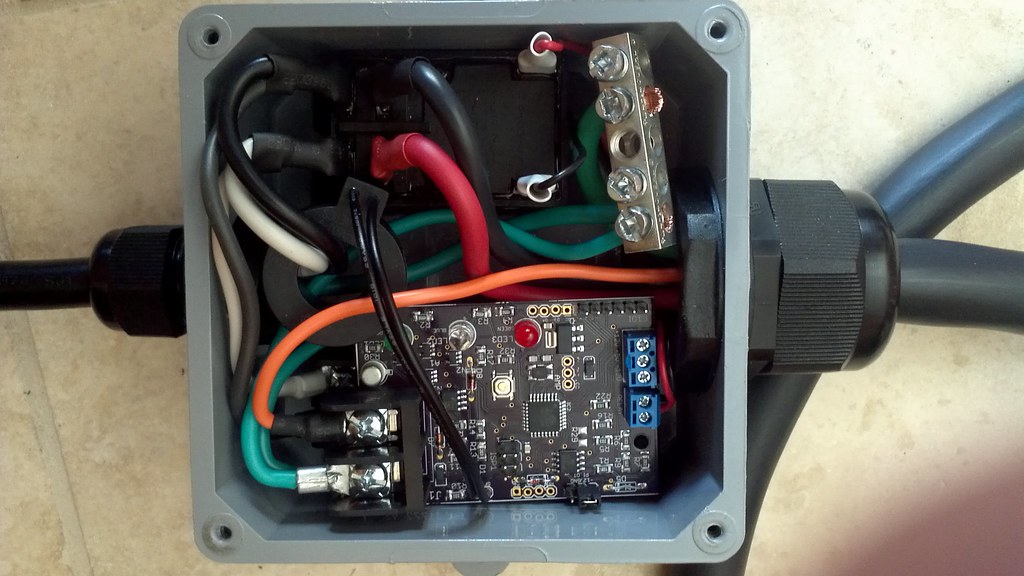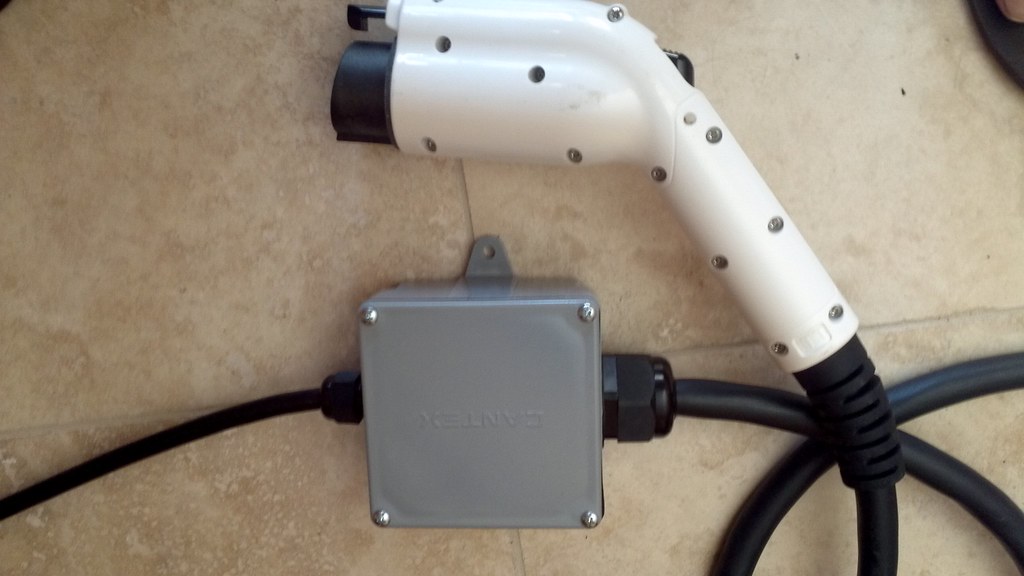Not that much of an issue. After all - many people already have 1-phase 240V 200A service to their home which is capable of 38 kW. Not unheard of to get 400A service to your home. The Tesla EVSE already does 240V 70A and the J1772 spec can do that, too with the right EVSE. Not that much of a stretch to get at least 20 kW quick charge at home or more if you really wanted it.themotorman said:That is true but to get that much power from the utility you'll need to be on 3 phase, they would not like the huge imbalance on their lines.
You are using an out of date browser. It may not display this or other websites correctly.
You should upgrade or use an alternative browser.
You should upgrade or use an alternative browser.
Weekend(s) Project - DIY EVSE
- Thread starter chris1howell
- Start date

Help Support My Nissan Leaf Forum:
This site may earn a commission from merchant affiliate
links, including eBay, Amazon, and others.
DarkStar
Well-known member
I have a 200 amp service from the power utility, that's 48 kW (full LEAF charge in 33 minutes at full power). Sure I'm simplifying things a bit, but three-phase isn't necessary for DC Quick Charging, it just makes things easier and safer.themotorman said:That is true but to get that much power from the utility you'll need to be on 3 phase, they would not like the huge imbalance on their lines. A major problem with the EV infrastructure is that the power needed for fast charging is extremely high.
The future of home DC Quick Charging won't be to get a full charge in 45 minutes (like current three-phase DC Quick Chargers), but will be more like 2 hours. You would only need a 13.2 kW service, or about 55 amps. Easily do-able at most homes.
fotajoye
Well-known member
Chris:
Sounds excellent...as I remember your board also has GFI included...cool.
BTW, I don't know if you watch Rickard at http://www.evtv.me but if you want to see another approach to a EVSE, with a crude GFI, click on his blog and observe the diagram. Also, his video shows the parts he will use to construct it, if you have the time to watch it. He's not an EE but nevertheless, he quite a guy and works hard at producing a weekly video for the DIYers who build their own EVs.
Sounds excellent...as I remember your board also has GFI included...cool.
BTW, I don't know if you watch Rickard at http://www.evtv.me but if you want to see another approach to a EVSE, with a crude GFI, click on his blog and observe the diagram. Also, his video shows the parts he will use to construct it, if you have the time to watch it. He's not an EE but nevertheless, he quite a guy and works hard at producing a weekly video for the DIYers who build their own EVs.
chris1howell
Well-known member
I have been following the EVSE from Modular power. It’s a 4 layer board, fairly complex, costs a lot and does not include power supply or implement any of the safety features.
If you were to buy the recommended parts, It would cost more than a basic EVSE. EVTV estimates $900.
EVSE board $240
UL J1772 cable $260
Power Supply $100
GFCI circuit breaker $117
Contactors $200
Case and misc parts
I am hoping to sell my EVSE controller board with power supply, with GFCI, implementing all of the J1772 safety features including the "diode check" for quite a bit less than $240.
I have been using the DIY EVSE for a several weeks as my primary EVSE. It is very reliable and stable. It runs very cool and draws almost no standby power (shows 0 W on a Killawatt).
If you were to buy the recommended parts, It would cost more than a basic EVSE. EVTV estimates $900.
EVSE board $240
UL J1772 cable $260
Power Supply $100
GFCI circuit breaker $117
Contactors $200
Case and misc parts
I am hoping to sell my EVSE controller board with power supply, with GFCI, implementing all of the J1772 safety features including the "diode check" for quite a bit less than $240.
I have been using the DIY EVSE for a several weeks as my primary EVSE. It is very reliable and stable. It runs very cool and draws almost no standby power (shows 0 W on a Killawatt).
DarkStar
Well-known member
Unfortunately, I agree that the EVSE board from Modular EV Power is a bit more expensive than I was expecting. Given the components and functionality I was really expecting it to come under $100, however he did add a lot of additional features that I wasn't expecting to the board as well.
themotorman
Active member
- Joined
- Jun 27, 2011
- Messages
- 36
chris1howell said:I have been following the EVSE from Modular power. It’s a 4 layer board, fairly complex, costs a lot and does not include power supply or implement any of the safety features.
If you were to buy the recommended parts, It would cost more than a basic EVSE. EVTV estimates $900.
EVSE board $240
UL J1772 cable $260
Power Supply $100
GFCI circuit breaker $117
Contactors $200
Case and misc parts
I am hoping to sell my EVSE controller board with power supply, with GFCI, implementing all of the J1772 safety features including the "diode check" for quite a bit less than $240.
I have been using the DIY EVSE for a several weeks as my primary EVSE. It is very reliable and stable. It runs very cool and draws almost no standby power (shows 0 W on a Killawatt).
FYI you can gte most opf this in the surplus market or on ebay for a small fraction of the above quoted costs.
If all yu want to do is charge at 240 volts at 12 amps there is a very simple way to do this. Costs is almost nothing and does not affect any Nissan warantees etc..
If anyone is interested email me directly at rdoctorsATgmailDOTcom
KevinSharpe
Well-known member
fully agree that we need a board below $100 so that we can shake up the EVSE market and force people to get real about this 'power cord'.DarkStar said:Given the components and functionality I was really expecting it to come under $100, however he did add a lot of additional features that I wasn't expecting to the board as well.
surfingslovak
Well-known member
- Joined
- Jun 13, 2011
- Messages
- 3,809
+1KevinSharpe said:fully agree that we need a board below $100 so that we can shake up the EVSE market and force people to get real about this 'power cord'.DarkStar said:Given the components and functionality I was really expecting it to come under $100, however he did add a lot of additional features that I wasn't expecting to the board as well.
chris1howell
Well-known member
The v3 prototype boards are coming together....
Stencil to apply solder for Surface mount components

2011-08-11_16-58-19_630 by chris1howell, on Flickr
Building 2 boards - Components placed ready for the hotplate.

2011-08-11_17-36-08_204 by chris1howell, on Flickr
Ready for through hole components

2011-08-15_20-10-53_473 by chris1howell, on Flickr
Ready for firmware and testing

2011-08-15_20-40-57_629 by chris1howell, on Flickr
Stencil to apply solder for Surface mount components

2011-08-11_16-58-19_630 by chris1howell, on Flickr
Building 2 boards - Components placed ready for the hotplate.

2011-08-11_17-36-08_204 by chris1howell, on Flickr
Ready for through hole components

2011-08-15_20-10-53_473 by chris1howell, on Flickr
Ready for firmware and testing

2011-08-15_20-40-57_629 by chris1howell, on Flickr
KevinSharpe
Well-known member
great work Chris, well donechris1howell said:The v3 prototype boards are coming together....
KevinSharpe
Well-known member
currently testing with J1772, "mennekes", and Tesla connectors...
chris1howell
Well-known member
Kevin... I hope the testing is going well.
Here is my current setup. GFCI is active and performing very well...

2011-09-09_14-29-53_33 by chris1howell, on Flickr

2011-09-09_14-32-39_457 by chris1howell, on Flickr
Here is my current setup. GFCI is active and performing very well...

2011-09-09_14-29-53_33 by chris1howell, on Flickr

2011-09-09_14-32-39_457 by chris1howell, on Flickr
surfingslovak
Well-known member
- Joined
- Jun 13, 2011
- Messages
- 3,809
Looks awesome! I was hoping that an EVSE could be more compact than what we have seen so far on the market and I never understood why they would run hot. Very impressive overall.chris1howell said:Here is my current setup. GFCI is active and performing very well...
To follow up on our earlier exchange with lincomatic, I forwarded a few J1772 vendor leads to Kevin Sharpe couple of months ago. He graciously offered to contact them through his firm. Most, if not all of them, are more accustomed to working with commercial buyers, not private parties. Have you thought of the enclosure? Is it going to be something custom or off the shelf?
Please let me if and when a board was available for purchase. It doesn't look like you need more testers or collaborators, but if you did, please count me in.
fotajoye
Well-known member
Chris:
Nice; ever notice how products in EE get smaller, stronger and less costly; while the other engineering disciples, in general, move their products the other way?
Good work!
Nice; ever notice how products in EE get smaller, stronger and less costly; while the other engineering disciples, in general, move their products the other way?
Good work!
MichaelS
Member
Hi,
My first post on the forum. Very impressive engineering.
I have not read all of the posts, but I'd like to propose using an SSR (solid state relay) instead of contactors. You can get 240V 50 amp opto-isolated AC relays for way under $100.
My first post on the forum. Very impressive engineering.
I have not read all of the posts, but I'd like to propose using an SSR (solid state relay) instead of contactors. You can get 240V 50 amp opto-isolated AC relays for way under $100.
themotorman
Active member
- Joined
- Jun 27, 2011
- Messages
- 36
MichaelS said:Hi,
My first post on the forum. Very impressive engineering.
I have not read all of the posts, but I'd like to propose using an SSR (solid state relay) instead of contactors. You can get 240V 50 amp opto-isolated AC relays for way under $100.
You can get contactors ( surplus market ) for much less and they guarantee complete isolation.
Although the power and control are opto-isolated or RF isolated the power switching is via triacs or SCRs and they can fail to a short.. It is very unusual for a contactor to short it's outputs.
I like solid state best but sometimes the electro-mechanical devices have an edge that is very hard to duplicate.
MichaelS
Member
All good points. I think a lot of the SSRs are now MOSFET.
Cheaper is better.
Thanks for the reply.
Cheaper is better.
Thanks for the reply.
garygid
Well-known member
Air Conditioner contactors are not very expensive.
chris1howell
Well-known member
All the components are now secure and I have added light pipes the cover.

2011-09-19_21-04-01_742 by chris1howell, on Flickr

2011-09-19_21-04-01_742 by chris1howell, on Flickr
Similar threads
- Replies
- 6
- Views
- 2K
- Replies
- 9
- Views
- 4K


